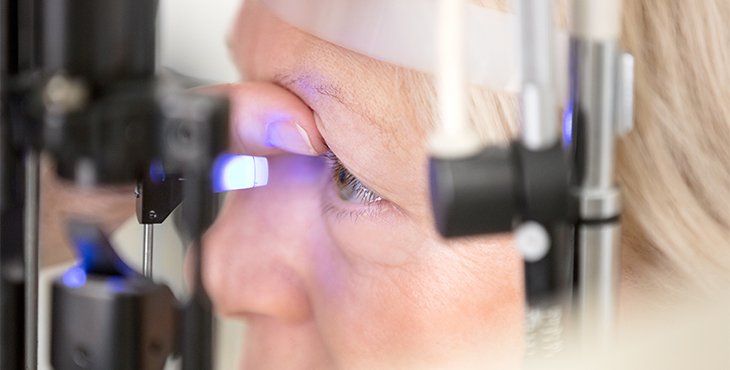VA researchers recently published two studies showing that the rate of eye disease may be increasing in the VA system, and that Veterans with serious mental illness have a higher rate of eye diseases than other Veterans.
The research team at the VA Capitol Health Care Network Mental Illness Research, Education and Clinical Center and the University of Maryland School of Medicine believe these studies highlight important trends among Veteran patients. Vision Research Month, observed during June, is an appropriate time to focus on these health issues.
The first study, published in the November–December 2016 issue of General Hospital Psychiatry, showed that VA patients with serious mental illness have an even higher rate of dry eye, cataract and glaucoma than the general Veteran population. Both glaucoma and cataract are leading causes of blindness worldwide.
The second study, published in the January 2017 edition of the American Journal of Ophthalmology, found that the rate of eye disease, specifically glaucoma and cataract, increased in the VA Capitol Health Care Network from 2007 to 2011. (The study did not include data from later time points.) The increases were seen mainly in the 50–65 and over-65 age groups.
Glaucoma is a leading cause of irreversible blindness worldwide. Patients can have the disease for years without knowing it, but once the patient notices the disease, it is often too late. Glaucoma causes damage to the optic nerve, the nerve that carries the information from the eyeball to the brain. It is generally a very slow disease, taking years or even decades to cause noticeable changes in vision. People at higher risk for the disease include those older than 55, individuals of African American or Hispanic origin, and those with a family history of the disease. Because there are no symptoms of the disease early on, eye screening is needed to detect it. However, if the disease is caught early, treatment can prevent vision loss. Treatment for the disease includes eye drops, laser treatment, or in more advanced cases, eye surgery. Those who are at higher risk for the disease should consider regular screening.
Cataract is another leading cause of vision loss. A cataract happens when the lens of the eye becomes cloudy over time. This happens in all individuals with aging, and it is estimated that half of all people age 80 or older will have had cataract surgery or need cataract surgery.
Patients with cataract will notice blurriness of vision at distance, or glare that may be most bothersome when driving at night. Patients with diabetes or those on long-term steroids for medical conditions may develop cataracts earlier in life. Cataracts can be removed with a relatively simple surgery that often takes 20 minutes or less.
VA patients, particularly those above the age of 55 and those in high-risk groups, should consider getting their eyes examined to screen for major eye diseases such as cataract and glaucoma to prevent vision loss. We hope our work raises awareness of the growing need for eye care in the VA system, particularly among high-risk groups as well as those with serious mental illness. If the rate of eye disease continues to increase with the aging Veteran population, more resources may need to be allocated towards eye care. In addition to more clinic capacity, greater availability and facilities for cataract surgery should also be addressed.
 |
 |
Osamah Saeedi, M.D., is an associate professor of ophthalmology at the University of Maryland School of Medicine in Baltimore. Dr. Saeedi completed medical school and an ophthalmology residency at the University of Texas – Southwestern Medical Center, and a glaucoma fellowship at the Wilmer Eye Institute, Johns Hopkins University. He is the recipient of an NIH Career Development Award and has grant funding from numerous other organizations, including the American Glaucoma Society.
Julie Kreyenbuhl, Pharm.D., Ph.D., is associate director of the Research Core for the VA Capitol Health Care Network Mental Illness Research, Education and Clinical Center, and an associate professor within the University of Maryland School of Medicine, Department of Psychiatry, Division of Psychiatric Services Research. Her research focus is on the pharmacoepidemiology of serious mental illness, and she has contributed extensively to the development of evidence-based treatment guidelines for schizophrenia. Dr. Kreyenbuhl has received funding for her research from VA, the National Institutes of Health, and private foundations, and has authored or co-authored over 85 publications in peer-reviewed scientific journals.
Topics in this story
More Stories
Diverse representation of women in health care research allows MVP to make discoveries for women’s health
Join the Million Veteran Program online. You will have the option to receive an at-home blood sample collection kit in the mail.
VHA's new podcast series, New Horizons in Health, features a candid discussion of psychedelic assisted therapies for Veterans experiencing mental health conditions.







Will the VA accept responsibility and compensate? I have had cataract surgery w/man made lenses (Forever Lenses) implanted by DR. Wang in Nashville Tn. VA compensated w/10%. Also his diagnoses of extreme dry eye that rips the outer layer of both eyes and is extremely painful, has scared the outer part of the eyes.
I had PRK surgery when I was at Ft. Bragg and now I have dry eye so bad that the pain is unbearable at times. I have mentioned this to my PCP and no response except to prescribe me more eye drops. I can deal with it, but it is aggravating.
Does the VA offer annual glaucoma screening , and are the eye drops Lataprost and Combigan available through
the VA Pharmacy. If such medications are available through the pharmacy, at what price? Is glaucoma screening
available at all VA centers? Same questions for Tenitus. Do these two items qualify for VA disability. For further
information, who would I contact? Will I receive an email response to these questions .
I have had cataract surgery and eye nerve damage. I have diabetes and very dry eyes. Served in extremely hot and dry weather .
Can you get compensated from the VA for glaucoma?
I am a retired veteran and have Glaucoma and dry eyes. I have the dry type of Glaucoma and have been using eye drops for the past 30 years.
My email address is (redacted)
The VA should consider Glaucoma screening for all Veterans, not just those that deployed in a war zone.
This is it about military service that causes so much serious mental illness anyway? Personally, I became very ill in Vietnam with serious permanent defects and medivaced after 3 weeks of chloroquine treatment, but I never got well. I never recovered, and right after being discharged was in a coma due to migraine headaches, fevers, seizures, and was forced into ice baths numerous times to hold my fever down. I was delirious and comatose for days. I had suffered these migraines after returning from Vietnam for months before being discharged, long with rheumatic fever, upper respiratory infections, group streptococcus with pharyngitis, sinusitis, bone pain heart palpitations, a skin disease, no ho knows what else because my medical records were withheld from me, hidden away, ne I was deceived bout them, being told they were destroyed. It’s been over 46 years now, and it’s still not corrected, so is it any wonder why progress is not being made. If you don’t recognize a problem, then you can’t fix it.
……Sounds like you must’ve hit some of the same joints in Saigon that they warned us about! :-)